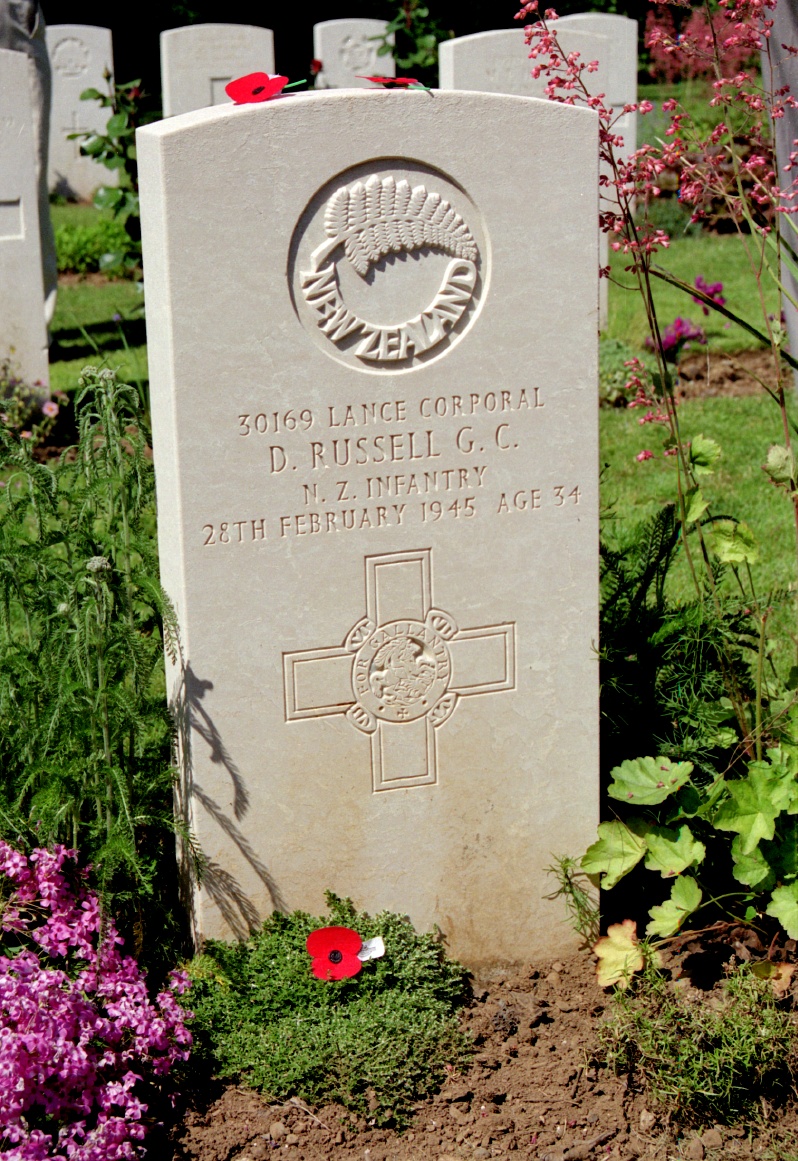

THE PRO PATRIA PROJECT
RUSSELL David
30169, Lance Corporal, 22nd Infantry Battalion, 2nd New Zealand Division, WW2
CITATION
George Cross
Gazetted 24 December 1948, p6669
In recognition of gallant and distinguished services whilst a prisoner of war in German hands (prior to September, 1945). Like so many other escaped prisoners-of-war, Lance-Corporal Russell had obtained civilian clothes and was living with an Italian peasant, Giuseppe Vettorello. He was well-known and liked by the people of the locality. According to Giuseppe Vettorello, Lance-Corporal Russell maintained contact with a number of other ex-prisoners-of-war, visiting them regularly by bicycle. On about 22nd February, 1945, Lance-Corporal Russell was arrested by a patrol of Italian Fascist troops near the house of Giuseppe Vettorello. Giuseppe Vettorello himself was arrested on suspicion of having harboured Lance-Corporal Russell. Their captors were members of a mixed German-Italian police regiment. The prisoners were taken to the Compay Headquarters of Oberleutnant Haupt at Ponte di Piave. Here an attempt was made to force Lance-Corporal Russell to betray Giuseppe Vettorello, but he refused to do so, denying that he had ever seen him before. According to an Italian soldier who was present, Lance-Corporal Russell was beaten up by Haupt, but maintained his silence. Thanks to Lance-Corporal Russell's loyalty, Giuseppe Vettorello was released. The Germans were evidently convinced that Lance-Corporal Russell had been in contact with other ex-prisoners-of-war and Partisans, and were determined that he should disclose their whereabouts. He was chained to a wall in a stable, and told that, unless he gave the required information within three days, he would be shot. Again, on the testimony of two Italians who were present, Lance-Corporal Russell was beaten up, but he resolutely refused to speak. A civilian who took him food tried to persuade him to save his life, but he replied, 'Let them shoot me'. Haupt's interpreter, an Italian says: 'The behaviour of the Englishman was splendid, and it won the admiration of Haupt himself'. On the third day Lance-Corporal Russell was shot. The German warrant officer who witnessed the execution, says: 'The prisoner died very bravely'. There can be be no doubt whatsoever that Lance-Corporal Russell in the midst of his enemies and in the face of death, bore himself with courage and dignity of a very high order."
KNOWN AWARDS
George Cross
1939-45 Star
Africa Star
Italy Star
Defence Medal
War Medal 1939-45
New Zealand War Service Medal
NOTES
Born 30 March 1911 Ayr, Scotland
Died 28 February 1945 Italy. [executed]
Buried Udine War Cemetery, Italy. [Plot IV. D. 2]
BIOGRAPHICAL
Born in Scotland in 1911, David RUSSELL came to New Zealand from Australia in 1938. He worked as an orderly at Napier Hospital for two years before volunteering for the 2nd NZEF at the outbreak of WW II.
